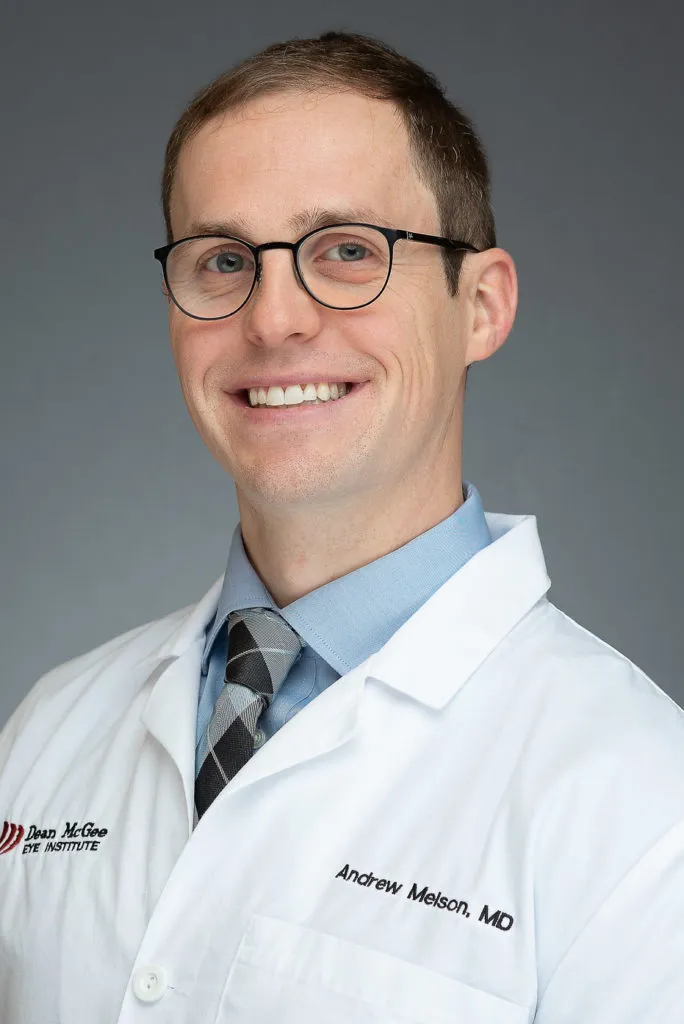Andrew T. Melson, MD is passionate about helping patients understand more about their complex eye conditions—particularly when it comes to neurologic problems that may affect visual function. His knack for teaching and helping others served him well during his residency and neuro-ophthalmology fellowship at the Dean McGee Eye Institute (DMEI). Here’s more about Dr. Melson and what he contributes to the DMEI team.
Q: Where did you grow up and when did you first realize you wanted to pursue a career in medicine?
A: I grew up in a suburb of Cincinnati, Ohio, where I completed elementary through high school. My father is an engineer and my mother is a physical therapist, so solving complex problems and helping others with their health were modeled to me from a young age. I finalized my interest in medicine and ophthalmology following a medical outreach trip to Ghana, where I witnessed firsthand the impact an ophthalmologist can make on the lives of others.

Q: What led you to join DMEI and why did you want to complete your residency and fellowship here?
A: A trusted mentor in medical school informed me that DMEI was among the best training programs in the country for ophthalmology. It turned out to be a perfect match with my professional goals, and I was blessed to be offered a position. In residency, I developed a specific interest in neuro-ophthalmology and decided to pursue specialty training at DMEI, as the fellowship provides a unique emphasis on surgical management of adult strabismus.
Q: Can you explain your area of expertise to us? What does it mean to perform neuro-ophthalmology?
A: Neuro-ophthalmology is the study of diseases that affect how the eyes and the brain communicate with each another. This includes problems with the optic nerves and parts of the brain dedicated to vision as well as diseases of eye movement and alignment. Practicing neuro-ophthalmology often means taking a multidisciplinary approach to work with neurologists, neurosurgeons, and other medical providers to solve complex neurological problems that affect visual function.
Q: What attracted you to neuro-ophthalmology?
A: Neuro-ophthalmic diseases can be confusing and a great source of fear for patients. I particularly enjoy helping patients with complex problems come to a better understanding of their disease while offering evidence-based treatment options and education.
Q: What are the most common conditions that would bring someone to DMEI to see you? What are some of the factors that can cause these issues?
A: I commonly see patients for double vision, eye misalignment, strokes that affect vision, unexplained vision loss, and uncontrollable eyelid spasms. I also see patients for cataracts, unexplained vision loss, and routine eye examinations. While age is a primary risk factor for most eye diseases, high blood pressure, diabetes, and high cholesterol play a significant role as well.
Q: Tell us about the Fellow Teaching Award at DMEI.
A: The Annie Moreau Fellow Teaching Award is named after Annie Moreau, MD, FACS who I am now privileged to have as a colleague. It’s awarded at the discretion of the DMEI residents to a fellow who exemplifies the dedication to resident education and pedagogical spirit of its namesake. Teaching is a passion of mine and it was a great honor to receive this award.
Q: What do you like to do during your spare time?
A: I enjoy spending time with my wife, Danielle, who is a physical therapist and CrossFit instructor. Together we enjoy traveling, staying fit, and going on culinary adventures.
Eye Care at DMEI
Whether your needs are as simple as a new pair of glasses or as complex as innovative eye surgery, DMEI’s array of services cover the full spectrum of eye care for patients of all ages. Schedule an appointment by calling 405.271.6060 or 800.787.9012.
